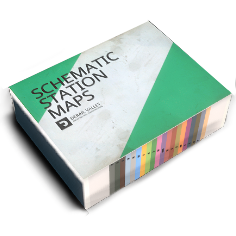Braking Overview/de: Difference between revisions
Updating to match new version of source page |
Updating to match new version of source page |
||
| Line 22: | Line 22: | ||
<div lang="en" dir="ltr" class="mw-content-ltr"> | <div lang="en" dir="ltr" class="mw-content-ltr"> | ||
Some of the main risks associated with brakes are: | Some of the main risks associated with brakes are: | ||
* Parked trains turning into runaways due to {{pll|Cylinder Leaks|brake cylinder leaks}} and | * Parked trains turning into runaways due to {{pll|Cylinder Leaks|brake cylinder leaks}} and misapplied {{pll|Handbrake|handbrakes}}. | ||
* Forgotten applied {{pll|Handbrake|handbrake(s)}} resulting in hindered {{pll|Vehicle Catalog Overview|pulling power}}. | * Forgotten applied {{pll|Handbrake|handbrake(s)}} resulting in hindered {{pll|Vehicle Catalog Overview|pulling power}}. | ||
* Badly set up {{pll|Air Brake System Overview|brake pipe valves}} leading to limited brake availability. | * Badly set up {{pll|Air Brake System Overview|brake pipe valves}} leading to limited train brake availability. | ||
* Traction loss resulting in {{pll|Wheelslide|wheelslide}} if brakes are applied too hard in {{pll|Weather|wet conditions}}. | * Traction loss resulting in {{pll|Wheelslide|wheelslide}} if brakes are applied too hard in {{pll|Weather|wet conditions}}. | ||
* Prolonged mechanical brake usage resulting in {{pll|Brake Shoes|brake shoe overheating}} and loss of braking power. | * Prolonged mechanical brake usage resulting in {{pll|Brake Shoes|brake shoe overheating}} and loss of braking power. | ||
| Line 36: | Line 36: | ||
<div lang="en" dir="ltr" class="mw-content-ltr"> | <div lang="en" dir="ltr" class="mw-content-ltr"> | ||
Depending on the session {{pll|Difficulty|difficulty settings}}, a flashing warning light above the {{pll|Monitoring|brake pipe gauge}} indicates | Depending on the session {{pll|Difficulty|difficulty settings}}, a flashing warning light above the {{pll|Monitoring|brake pipe gauge}} indicates certain problems with the braking system. They are: | ||
* There is a {{pll|Handbrake|handbrake}} applied somewhere on the train. | * There is a {{pll|Handbrake|handbrake}} applied somewhere on the train. | ||
* One of the {{pll|Air Brake System Overview|brake pipe valves}} is incorrectly setup somewhere on the train. | * One of the {{pll|Air Brake System Overview|brake pipe valves}} is incorrectly setup somewhere on the train. | ||
Latest revision as of 23:13, 3 April 2025
Bremsen sind Einrichtungen an Schienenfahrzeugen, die dazu dienen, Fahrzeuge zu verlangsamen, zum Stillstand zu bringen und anschließend zu sichern. Es gibt verschiedene Arten von Bremsen, die jeweils auf einen bestimmten Zweck abgestimmt sind. Als Bedieneinrichtung von Bremsen werden üblicherweise Hebel oder Handräder verwendet, die sich im Führerstand oder an der Außenseite eines Fahrzeugs befinden.
Zum Anlegen der Bremsen werden die Bremsventile fast immer von einem wegbewegt. Dies führt in Gefahrensituationen zu einer intuitiven Bedienung der Einrichtungen zur sicheren Seite hin.
Die Bremseinrichtungen werden wie folgt unterschieden:
Zugbremse (indirekte Bremse):
Beeinflusst alle Bremsen in einem Zug. Sie wird hauptsächlich zum Abbremsen und Anhalten von Zügen verwendet.
Risks
Some of the main risks associated with brakes are:
- Parked trains turning into runaways due to brake cylinder leaks and misapplied handbrakes.
- Forgotten applied handbrake(s) resulting in hindered pulling power.
- Badly set up brake pipe valves leading to limited train brake availability.
- Traction loss resulting in wheelslide if brakes are applied too hard in wet conditions.
- Prolonged mechanical brake usage resulting in brake shoe overheating and loss of braking power.
- Incorrectly setup brake cutout valves, resulting in dysfunctional train brakes.
- Excessive dynamic brake use leading to powertrain overheating.
Warnings
Depending on the session difficulty settings, a flashing warning light above the brake pipe gauge indicates certain problems with the braking system. They are:
- There is a handbrake applied somewhere on the train.
- One of the brake pipe valves is incorrectly setup somewhere on the train.
- There are more than one brake control devices cut in, or none is, on the train.
